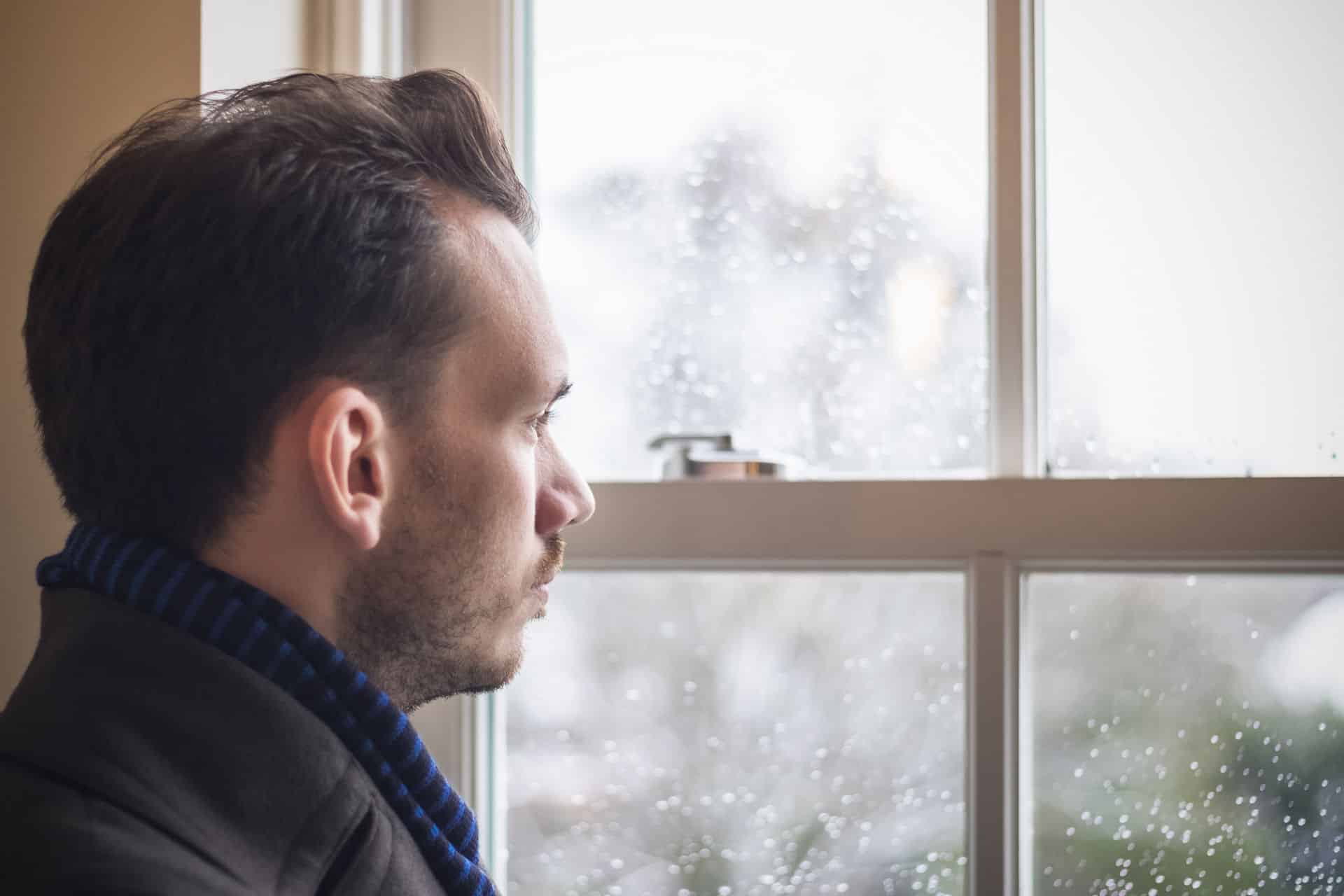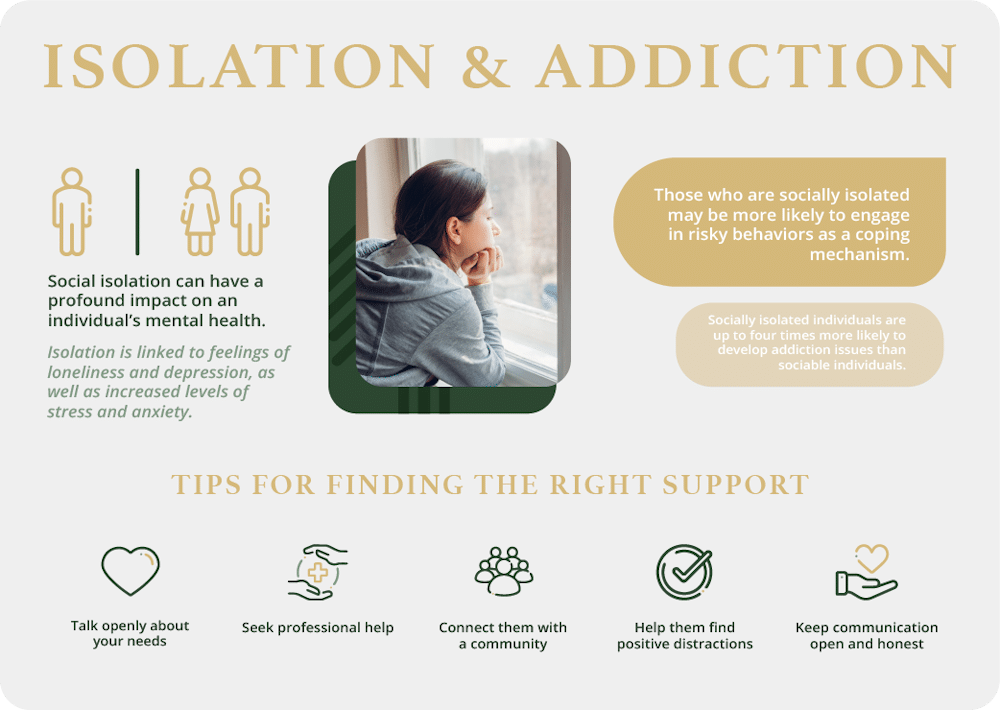The effects of social isolation and substance abuse are complex and involve multiple factors. An individual’s environment, mental health, and past experiences can lead to substance abuse, but studies show that isolation is also one of the most prominent risk factors for addiction.
At Eagle Creek Ranch Recovery Recovery in Nampa, Idaho, our rehab facility specializes in treating addiction and mental illness. In this article, we explore the relationship between isolation and addiction, and how receiving treatment can be the catalyst for breaking the cycle.
How Can Social Isolation Affect a Person?
Social isolation can have a profound impact on an individual’s mental health. It is linked to feelings of loneliness and depression, as well as increased levels of stress and anxiety. Isolation can lead to a sense of disconnectedness from family members, friends, and society in general, which can further erode an individual’s self-esteem and confidence.
It can also lead to feelings of hopelessness and worthlessness, dramatically decreasing a person’s ability to take action and make positive changes in their life. Social isolation can even interfere with an individual’s ability to form close relationships, leading to further loneliness and depression.
Isolation can have a significant emotional toll on a person. It can lead to feelings of loneliness and isolation, which may further contribute to depression and other mental health issues. Additionally, isolation can also cause stress, anxiety, and even anger due to the lack of social interaction with others. This feeling of separation from society can be especially damaging for those who are already struggling with mental health issues.
Social relationships are an important part of our lives and provide valuable emotional support, which is why being isolated for long periods can have such a damaging effect on mental health. People living in isolation may also experience difficulty sleeping, concentrating, and eating due to the lack of stimulating activities that are typically found in social settings.
Social isolation can have a significant physical effect on the body, from fatigue and weakened immunity to an increased risk of cardiovascular disease. It has been linked to an increased risk of high blood pressure, diabetes, obesity, and other chronic health conditions. Loneliness can cause sleep disturbances and even lead to premature death. Socially isolated individuals may also experience higher levels of stress, which can lead to depression and anxiety.
Additionally, those who are socially isolated may be more likely to engage in risky behaviors, such as substance abuse or unsafe sexual practices. Individuals need to seek out healthy social connections with family and friends as a way to counteract the physical effects of social isolation.
Is Social Isolation the Same Thing as Loneliness?

Social isolation occurs when someone does not have access to or contact other people. It can be voluntary or involuntary and can vary in terms of duration and degree. People may choose to socially isolate themselves for a variety of reasons, such as personal preference, religious beliefs, or health concerns. Social isolation can also result from external forces such as racism, addiction, poverty, or discrimination.
Loneliness is the subjective feeling of being disconnected or cut off from others. It is often accompanied by a sense of emptiness and despair, as well as a feeling of not being understood by those around them. Loneliness can be acute—that is, it may last only briefly—or it can become chronic. People who experience loneliness for long periods of time are more likely to suffer from mental and physical health problems.
The COVID-19 Pandemic Increased the Likelihood of Substance Use Disorders
The COVID-19 pandemic has had a significant impact on those dealing with Substance Use Disorders (SUDs). Social isolation, loneliness, and financial uncertainty have all been linked to an increase in drinking and drug use. The disruption of traditional support services, such as 12-step meetings, therapy sessions, and peer support groups has left many SUDs sufferers feeling isolated and uncertain.
The lack of access to in-person support services has created barriers for those seeking help, including reduced motivation and difficulty connecting with treatment providers. Additionally, the closure of many businesses and the disruption of normal routines can lead to increased feelings of stress and anxiety, which may contribute to an increase in substance use.
Although the pandemic has created additional challenges for people struggling with SUDs, there are still effective resources and treatment options available to help those in need. Telehealth, online support groups, virtual therapy sessions, and other remote services can provide much-needed assistance during this difficult time. In addition, many municipalities have established hotlines that offer 24/7 access to crisis counselors, support specialists, and other resources.
Additionally, there are many national organizations and programs such as the Substance Abuse and Mental Health Services Administration (SAMHSA) that can provide support and guidance for individuals in need. However, treatment is only effective when it is tailored to an individual’s specific situation and needs. Therefore, it is important to consult a qualified mental health professional to develop an effective plan of care and manage the stressors of the current pandemic.
How Are Social Isolation and Addiction Related?
Social isolation and substance abuse are often linked. People who are socially isolated may turn to substances for comfort or solace to cope with difficult emotions, such as depression, anxiety, loneliness, or shame. Substance use can provide an escape from the daily stressors of life or a way to self-medicate when feeling overwhelmed by emotions.
On the other hand, those who already struggle with substance use may become more socially isolated due to a fear of judgment or rejection from friends and family. Substance abuse can also cause an individual to lose track of time, leading them to neglect important relationships in their life. This further contributes to social isolation as people tend to avoid situations where they may be judged or criticized. Lastly, substance abuse can lead to legal problems which can further contribute to feelings of isolation and fear.
Overall, it is important to recognize the link between substance use and social isolation. Substance use can increase an individual’s risk of developing symptoms related to depression and anxiety as well as impair their ability to maintain meaningful and healthy relationships. Therefore, it is important to be aware of and address the underlying issues that may lead to substance abuse to prevent social isolation.
Loneliness and Alcohol
Alcoholism and loneliness often go hand in hand. When an individual is lonely, they may turn to alcohol to fill the void in their life. Alcohol can become a way to cope with emotions that are difficult to manage without support. At first, drinking may seem like a good solution for dealing with loneliness, but it quickly becomes a crutch that makes it harder to manage those feelings. The more an individual drinks, the deeper their loneliness can become as alcohol consumption leads to social isolation and depression.
Alcohol use can also worsen feelings of loneliness by making it difficult to form or maintain meaningful relationships. As drinking increases, so does the risk of damaging personal connections with family and friends. Alcohol-fueled behaviors, such as being unreliable or aggressive, can make it even harder to maintain a support system of meaningful relationships and further isolate the individual from their peers.
How Do I Know if Someone is Dealing With Isolation and Addiction?

If you have noticed changes in behavior like excessive drinking, drug use, or gambling, it could indicate an addiction problem. It’s best to address these issues head-on by gently talking to the person and expressing your concern.
Letting them know that they are not alone and that help and support are available can be very comforting. It’s also important to remember that loneliness, addiction, and other mental health issues can be difficult to talk about so it’s essential to remain patient and understanding when having these conversations.
Isolation and Addiction: Finding Help for a Loved One
If you have a loved one dealing with addiction and loneliness, it can be difficult to know how to help them. While there is no one-size-fits-all solution, here are some tips for finding the right support for them:
- Talk openly about their needs
- Seek out professional help
- Connect them with a community
- Help them find positive distractions
- Keep communication open and honest
Talking openly about their needs is the first step in finding help for someone dealing with addiction and loneliness. You can discuss to understand what kind of support they need and who would be able to provide it. This could be in the form of professional counseling, medical care, or spiritual guidance.
Seeking professional help is also important. Addiction specialists and mental health professionals can offer valuable insight into how to manage addiction and loneliness. They can also provide advice on treatment options that may be right for your loved one.
Help is Available If You’re Struggling at Eagle Creek
At Eagle Creek Ranch Recovery Recovery, our utmost concern is treating those who walk through our facilities on an individualized basis. If you or a loved one would like to find out more, you can contact us here.

Clinical Director
Kendall Maloof is the clinical director at Eagle Creek Ranch Recovery. She is a licensed marriage and family therapist and has held multiple leadership roles before settling here at Eagle Creek Ranch Recovery. Kendall received her master’s degree in marriage and family therapy from the Chicago School of Professional Psychology in 2016. Her career in mental and behavioral health began in 2014 when she took up internships in both the nonprofit and for profit sectors. She interned at multiple reputable companies, such as The Living Success Center and 449 Recovery in California.
In 2019, Kendall became the clinical director of Sunsets Recovery for Woman, a dual diagnosis program in southern California. Kendall is a natural leader. She has an incredible ability to problem solve and stay calm in any situation. Kendall never fails to show up when she is needed, and her calm demeanor makes her team and clients feel at ease. Eagle Creek Ranch Recovery is proud to have Kendall as our clinical director.




